It looks like you're using an Ad Blocker.
Please white-list or disable AboveTopSecret.com in your ad-blocking tool.
Thank you.
Some features of ATS will be disabled while you continue to use an ad-blocker.
5
share:

Growing up in the United States in the 1980s, the Soviet Union was the bogeyman of my youth. Movies like The Day After and Red Dawn instilled a palpable fear that the “red menace” could rain down invasion or nuclear Armageddon upon our heads at a moment’s notice. Other bits of late-cold-war schlock like Rocky IV, with its sneering and laughably-named caricature villain Ivan Drago (“I must break you!”) reflected the belief that, if not necessarily a stronger power, the Soviet colossus was at least a potential equal and a true force to be reckoned with. As late as 1987 or 1988, the notion that the Soviet Union would be in shambles in a handful of years was laughable to most - the province of fringe crackpots and tinfoil-hat types.
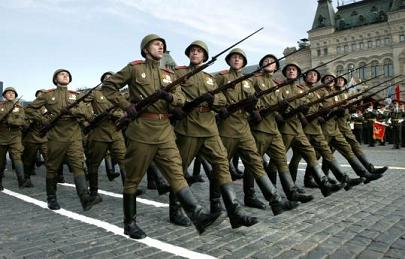

And yet, by 1989 the Berlin Wall had fallen, and two years later the Soviet Union itself melted down in a welter of confusion, soon to be overtaken in the Western psyche by other bogeymen of choice (Japan, briefly, followed by the “Asian Tigers” and now, perhaps, China). For Americans, Russia quickly shifted from an object of dread to one of pity and ridicule.
What happened? How could such a terrifying force, the stuff of childhood and adult nightmares alike, vanish in a puff of smoke over the course of several years? How could almost everyone in the West have missed the signs, despite a near-obsessive level of attention to this cold-war arch-nemesis?
And could something similar happen just as rapidly to today’s stumbling American empire?
This thread will examine the rapid meltdown of the mighty Soviet empire with an eye to see exactly how it slid into the gutter of history at warp speed. The lessons we can draw from this collapse are of great value to Americans and those in other advanced nations, currently struggling with a bouquet of deepening and seemingly insurmountable problems.
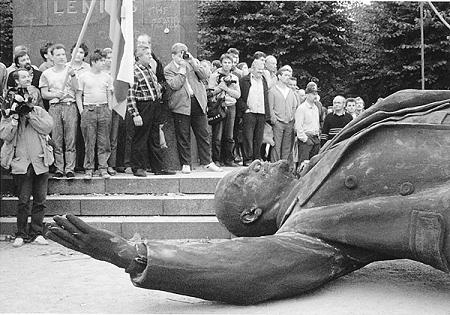
edit on 4/14/2012 by silent thunder because: (no reason given)
A Failure of Vision
Although the collapse seemed to happen quickly, the roots of the problems faced by the USSR in the 1980s ran deep. The so-called “era of stagnation” which began in the mid-1970s was a lingering period of economic standstill in which living standards did not grow, aggravated by a long and difficult war in Afghanistan (sound familiar?). The planned economy produced large amounts of goods, but they were generally goods people didn’t want, leading to massive waste. Innovation was punished by the very nature of the communist system, which did not distribute rewards fairly to encourage growth and progress. There were too few decision makers with too much centralized control in Moscow, they had trouble handling the huge Soviet empire, and they were distant and out-of-touch with on-the-ground conditions. Bureaucracy was cumbersome, people were not allowed to raise concerns honestly and frankly, communication was poor, and data was fudged to make everything seem better than it really was, leading to a blind government that didn’t even see the emerging problems. Corruption, cronyism, and other woes were rampant.
Hobbled by a strong adherence to ideology, a lapdog press, and false data, the government had all the power, but it lacked the vision to even recognize what was wrong. Of all the organs of the Soviet government, the KGB had perhaps the clearest sense of the true nature of things, but it wasn’t powerful enough in itself to handle the situation.
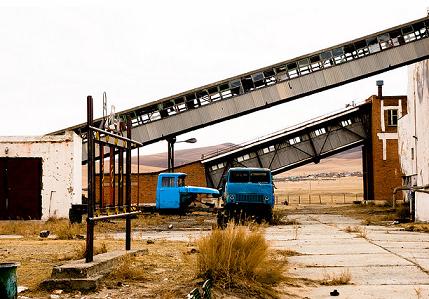
Mutliple choice: The picture above was taken in: A) Donskoy or B) Detroit?
Lesson: The Soviet Union wasn’t as strong as it seemed, but people and government alike were blind to the true nature of things. Propaganda – both Soviet and U.S. – clouded the minds of the entire world to the realities of the empire’s decay. Meanwhile, large numbers of people in both the USSR and the West had a vested interest in maintaining old illusions long after they ceased to be viable. People see what they want to see, and what is easy and convenient to see.
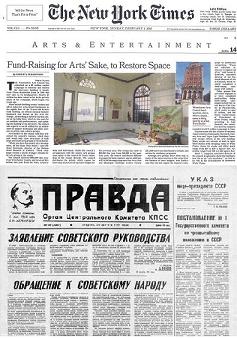
Although the collapse seemed to happen quickly, the roots of the problems faced by the USSR in the 1980s ran deep. The so-called “era of stagnation” which began in the mid-1970s was a lingering period of economic standstill in which living standards did not grow, aggravated by a long and difficult war in Afghanistan (sound familiar?). The planned economy produced large amounts of goods, but they were generally goods people didn’t want, leading to massive waste. Innovation was punished by the very nature of the communist system, which did not distribute rewards fairly to encourage growth and progress. There were too few decision makers with too much centralized control in Moscow, they had trouble handling the huge Soviet empire, and they were distant and out-of-touch with on-the-ground conditions. Bureaucracy was cumbersome, people were not allowed to raise concerns honestly and frankly, communication was poor, and data was fudged to make everything seem better than it really was, leading to a blind government that didn’t even see the emerging problems. Corruption, cronyism, and other woes were rampant.
Hobbled by a strong adherence to ideology, a lapdog press, and false data, the government had all the power, but it lacked the vision to even recognize what was wrong. Of all the organs of the Soviet government, the KGB had perhaps the clearest sense of the true nature of things, but it wasn’t powerful enough in itself to handle the situation.

Mutliple choice: The picture above was taken in: A) Donskoy or B) Detroit?
Lesson: The Soviet Union wasn’t as strong as it seemed, but people and government alike were blind to the true nature of things. Propaganda – both Soviet and U.S. – clouded the minds of the entire world to the realities of the empire’s decay. Meanwhile, large numbers of people in both the USSR and the West had a vested interest in maintaining old illusions long after they ceased to be viable. People see what they want to see, and what is easy and convenient to see.

edit on 4/14/2012 by silent thunder because: (no reason given)
The Dangers of Reform
When the problems became too big to ignore anymore, the push for reform resulted in the 1985 election of Mikhail Gorbachev to General Secretary. A young, dynamic outsider loathed by the old-school Soviet establishment who later went on to win the Nobel Peace Prize (sound familiar?) Gorbachev promised reform. His glasnost and peristrokia initiatives were aimed at shaking things up a bit, introducing more democracy and choice in elections and allowing for a wider range of cultural expression.
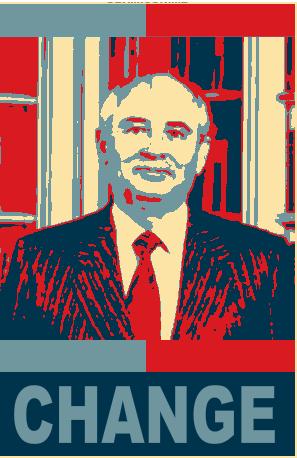
It sounded good on paper, but the changes had several negative effects. First, they angered and alienated the more conservative (in the sense of change-resistant, not political ideology) Soviet establishment, which felt threatened and fought back, destabilizing things. Secondly, with greater freedom of expression, things began to spiral out of control, particularly in the non-Russian Soviet states. Repressed voices suddenly spoke up, marches and demonstrations began in earnest, and people lost the fear they had of the government. By opening Pandora’s box and letting the “reform” genie out of the bottle, Gorby’s changes made him a bit like the “sorcerer’s apprentice” trying to control all the marching broomsicks he’d conjured to life, if you will forgive the heavily mixed metaphor. Except, for the USSR, there was no wise old wizard to come put things right at the end. Gorby had unleashed forces that ended up going in directions he did not expect.
It was not Gorbachev’s intention to dissolve the Soviet Union, but he didn’t realize that he wouldn’t be able to put leashes on the dogs he’d let out. Everyone from hardened gulag crime bosses and dissidents to money-hungry opportunists and leaders of ethnic liberation movements began to realize they suddenly had less to fear. And with a loss of fear, like it or not, often comes a loss of respect.
As central control began to melt, the old guard became increasingly strident in its attacks on Gorbachev and the reform-minded politicians. These in turn began to use structural change to attack their conservative rivals, who were forced to fight just as dirty in an escalating feedback spiral. Extreme partisanship and a climate of smear politics set in. Politicians were no longer thinking of the good of the nation as a whole – only their own survival. (Sound familiar?) They began to tinker with the basic structures of state to advance their own short-term political ends.
Lesson: “Reform,” even if undertaken without the intention of a top-to-bottom change, can spiral out of control and take on a life of its own. Political tinkering with good intentions can lead to events that become hard to control, and results that nobody intended. And when politicians use structural change to advance their own interests or fight rivals, the basic underpinnings of a state can quickly unravel.
The Center Cannot Hold
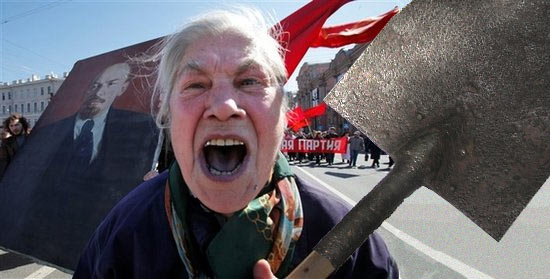
One of the most conspicuous features of the collapse was the strong resurgence of regional and ethnic/racial pride and protest, which took most observers (both domestically and abroad) completely by surprise. Protest followed protest, and old grievances began to be aired in marches, demonstrations, and more violent events. The litany of regional protest quickened: The Riga demonstrations in Latvia, the Jeltoqsan riots in Kazakhstan, the Baltic Molotov Pact protests, the environmental and Nagorno Karabakh demonstrations in Armenia, the Latvian “Singing Revolution,” the Estonian Popular Front, the Sumgait riots, the Partyja BPF in Byelorussia, the Tbilisi massacre…on and on, quicker and quicker…too many to list. The march of the sorcerer’s broomsticks escalated rapidly.
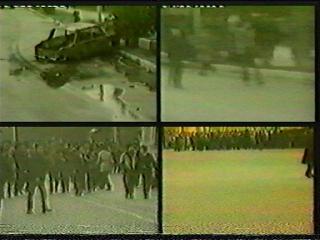
Above: the Sumgait Riots in Azerbaijan: A nasty piece of work.
Lesson: Ethnic pride and separatist impulses are always simmering, and can erupt at any time. Before it actually happened, the idea that the Soviet republics would break away seemed as unrealistic to most as the idea of U.S. states (or different races/ethnicities) going their own way. Complacency and comfortable familiarity blind people to reality.
When the problems became too big to ignore anymore, the push for reform resulted in the 1985 election of Mikhail Gorbachev to General Secretary. A young, dynamic outsider loathed by the old-school Soviet establishment who later went on to win the Nobel Peace Prize (sound familiar?) Gorbachev promised reform. His glasnost and peristrokia initiatives were aimed at shaking things up a bit, introducing more democracy and choice in elections and allowing for a wider range of cultural expression.

It sounded good on paper, but the changes had several negative effects. First, they angered and alienated the more conservative (in the sense of change-resistant, not political ideology) Soviet establishment, which felt threatened and fought back, destabilizing things. Secondly, with greater freedom of expression, things began to spiral out of control, particularly in the non-Russian Soviet states. Repressed voices suddenly spoke up, marches and demonstrations began in earnest, and people lost the fear they had of the government. By opening Pandora’s box and letting the “reform” genie out of the bottle, Gorby’s changes made him a bit like the “sorcerer’s apprentice” trying to control all the marching broomsicks he’d conjured to life, if you will forgive the heavily mixed metaphor. Except, for the USSR, there was no wise old wizard to come put things right at the end. Gorby had unleashed forces that ended up going in directions he did not expect.
It was not Gorbachev’s intention to dissolve the Soviet Union, but he didn’t realize that he wouldn’t be able to put leashes on the dogs he’d let out. Everyone from hardened gulag crime bosses and dissidents to money-hungry opportunists and leaders of ethnic liberation movements began to realize they suddenly had less to fear. And with a loss of fear, like it or not, often comes a loss of respect.
As central control began to melt, the old guard became increasingly strident in its attacks on Gorbachev and the reform-minded politicians. These in turn began to use structural change to attack their conservative rivals, who were forced to fight just as dirty in an escalating feedback spiral. Extreme partisanship and a climate of smear politics set in. Politicians were no longer thinking of the good of the nation as a whole – only their own survival. (Sound familiar?) They began to tinker with the basic structures of state to advance their own short-term political ends.
Lesson: “Reform,” even if undertaken without the intention of a top-to-bottom change, can spiral out of control and take on a life of its own. Political tinkering with good intentions can lead to events that become hard to control, and results that nobody intended. And when politicians use structural change to advance their own interests or fight rivals, the basic underpinnings of a state can quickly unravel.
The Center Cannot Hold

One of the most conspicuous features of the collapse was the strong resurgence of regional and ethnic/racial pride and protest, which took most observers (both domestically and abroad) completely by surprise. Protest followed protest, and old grievances began to be aired in marches, demonstrations, and more violent events. The litany of regional protest quickened: The Riga demonstrations in Latvia, the Jeltoqsan riots in Kazakhstan, the Baltic Molotov Pact protests, the environmental and Nagorno Karabakh demonstrations in Armenia, the Latvian “Singing Revolution,” the Estonian Popular Front, the Sumgait riots, the Partyja BPF in Byelorussia, the Tbilisi massacre…on and on, quicker and quicker…too many to list. The march of the sorcerer’s broomsticks escalated rapidly.

Above: the Sumgait Riots in Azerbaijan: A nasty piece of work.
Lesson: Ethnic pride and separatist impulses are always simmering, and can erupt at any time. Before it actually happened, the idea that the Soviet republics would break away seemed as unrealistic to most as the idea of U.S. states (or different races/ethnicities) going their own way. Complacency and comfortable familiarity blind people to reality.
edit on 4/14/2012 by silent thunder because: (no reason given)
The Curtain Falls
Finally in February 1990, with the situation getting out of hand everywhere, the Communist Party ended its 70-year ban on other political parties, opening the door to elections of the loud new voices and the assumption of power by regional and ethnic players. Throughout 1990, the 15 republics held their first-ever free elections, and in the non-Russian states, ethnic nationalists quickly came to power. The result was a series of legal moves in the smaller republics to leave the USSR and declare independence. By the end of 1991, only Russia was left in the USSR, and Gorbachev formally dissolved the USSR in December, handing the Soviet nuclear arsenal over to Boris Yeltsin, who would head Russia as an independent state. The red banner came down and the old Tsarist tricolor rose over a new nation.
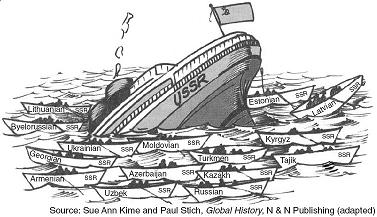
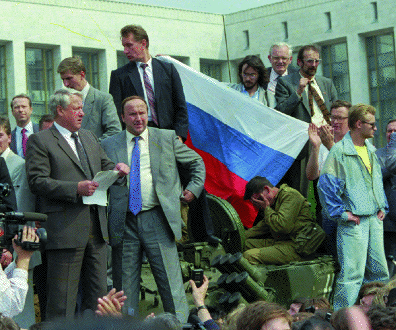
The well-known woes of the post-Soviet states are another topic altogether, and one that I could go on about for quite some time, having personally spent much of the last 20 years in this part of the world. We’ll save that for another day: my intention with this thread is more to look at the process of collapse itself – its speed, causes, and lessons for today’s teetering first-world powers: The US (my country of birth and citizenship, if no longer residence) and, to a lesser extent, senile Europe and sclerotic Japan.
Lesson: Be careful what you wish for. Things never end the way they begin, and good intentions are never enough.
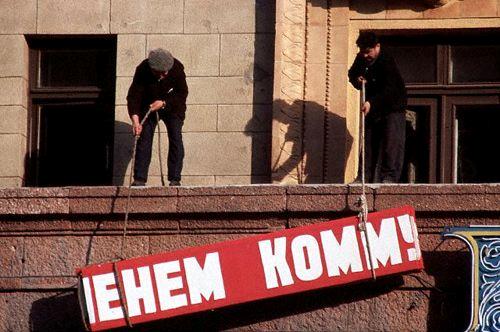
I believe it is not too late to keep America from going the way of the Soviets, even if the U.S. must scale back its ambitions in the harsh face of new realities. But if we remain blind, arrogant, and complacent (and ignore important lessons from history), things can change very quickly. Ultimately, our future is in our own hands. It is my deep hope that we can all learn to see with clearer eyes, before it really is too late.
-Silent Thunder
Finally in February 1990, with the situation getting out of hand everywhere, the Communist Party ended its 70-year ban on other political parties, opening the door to elections of the loud new voices and the assumption of power by regional and ethnic players. Throughout 1990, the 15 republics held their first-ever free elections, and in the non-Russian states, ethnic nationalists quickly came to power. The result was a series of legal moves in the smaller republics to leave the USSR and declare independence. By the end of 1991, only Russia was left in the USSR, and Gorbachev formally dissolved the USSR in December, handing the Soviet nuclear arsenal over to Boris Yeltsin, who would head Russia as an independent state. The red banner came down and the old Tsarist tricolor rose over a new nation.


The well-known woes of the post-Soviet states are another topic altogether, and one that I could go on about for quite some time, having personally spent much of the last 20 years in this part of the world. We’ll save that for another day: my intention with this thread is more to look at the process of collapse itself – its speed, causes, and lessons for today’s teetering first-world powers: The US (my country of birth and citizenship, if no longer residence) and, to a lesser extent, senile Europe and sclerotic Japan.
Lesson: Be careful what you wish for. Things never end the way they begin, and good intentions are never enough.

I believe it is not too late to keep America from going the way of the Soviets, even if the U.S. must scale back its ambitions in the harsh face of new realities. But if we remain blind, arrogant, and complacent (and ignore important lessons from history), things can change very quickly. Ultimately, our future is in our own hands. It is my deep hope that we can all learn to see with clearer eyes, before it really is too late.
-Silent Thunder
edit on 4/14/2012 by silent thunder because: (no reason given)
reply to post by silent thunder
America is not the Soviet Union. America, much like Western Europe, has had centuries of cultural buildup in regards to stable middle classes(America more so then Western Europe). Russia, and the vast majority of the Soviet Union was still practically in Medieval times right before the Second World War.
And what pathetically little Middle Class Lenin managed to create, Stalin violently and totally annihilated. If the SHTF, we will survive. The most we will see is a kind of super local racialism.
But the difference, I mean the REALLY, REALLY BIG DIFFERENCE is that the Soviet Union was held together via force. America not so, we don't have decades or centuries of pent up anger. Heck the one demographic to worry about in that regards(African American's) are already being displaced by Hispanic immigrants that can adopt in to American Caucasian culture(similar to how the Italians, Irish and Greeks assimilated) almost seamlessly.
So racially, America is still more or less unified. And as long as the people of a nation can stand by each other, that Nation will never truly fall.
America is not the Soviet Union. America, much like Western Europe, has had centuries of cultural buildup in regards to stable middle classes(America more so then Western Europe). Russia, and the vast majority of the Soviet Union was still practically in Medieval times right before the Second World War.
And what pathetically little Middle Class Lenin managed to create, Stalin violently and totally annihilated. If the SHTF, we will survive. The most we will see is a kind of super local racialism.
But the difference, I mean the REALLY, REALLY BIG DIFFERENCE is that the Soviet Union was held together via force. America not so, we don't have decades or centuries of pent up anger. Heck the one demographic to worry about in that regards(African American's) are already being displaced by Hispanic immigrants that can adopt in to American Caucasian culture(similar to how the Italians, Irish and Greeks assimilated) almost seamlessly.
So racially, America is still more or less unified. And as long as the people of a nation can stand by each other, that Nation will never truly fall.
Originally posted by korathin
America is not the Soviet Union.
I never said it was. The title uses the word "lessons," not "mirror image."
In the words of the master:
History doesn't repeat itself, but it does rhyme
-Mark Twain.
Fantastic piece of scholarship OP.
I think the one serious difference between the Soviet Empire and the American Empire is that the regionalism is much different. While there are regions within America, they are not of the variety that was the Soviet Empire. The American states have always been American states in regards to the people sans Hawaii, and Hawaiians are not exactly Latvians or fundamentalist Muslims. The Soviet states, were nations of their own until just a century ago, and they retained their regional, linguistic and ethnic identities.
So, I believe that the difference in dissolution is that the Soviet Empire had a way to dissolve, while the American Empire has no way to dissolve. This actually makes the situation here more volatile and dangerous, as there will be no outlet for such forces, resulting in some sort of muddy revolution instead of a somewhat tidy dissolution of states.
I think the one serious difference between the Soviet Empire and the American Empire is that the regionalism is much different. While there are regions within America, they are not of the variety that was the Soviet Empire. The American states have always been American states in regards to the people sans Hawaii, and Hawaiians are not exactly Latvians or fundamentalist Muslims. The Soviet states, were nations of their own until just a century ago, and they retained their regional, linguistic and ethnic identities.
So, I believe that the difference in dissolution is that the Soviet Empire had a way to dissolve, while the American Empire has no way to dissolve. This actually makes the situation here more volatile and dangerous, as there will be no outlet for such forces, resulting in some sort of muddy revolution instead of a somewhat tidy dissolution of states.
edit on 14-4-2012 by pirhanna because: (no reason given)
reply to post by silent thunder
Very nice.
I find it fascinating,even with all the ills in the former Soviet Union,that people still view the old regime,with respect,and should I say some wish for the old regime,once again.
Very nice.
I find it fascinating,even with all the ills in the former Soviet Union,that people still view the old regime,with respect,and should I say some wish for the old regime,once again.
Originally posted by korathin
But the difference, I mean the REALLY, REALLY BIG DIFFERENCE is that the Soviet Union was held together via force. America not so, we don't have decades or centuries of pent up anger.
Are you sure about that? Have you considered the possiblity that people in the old Soviet Union were not as oppressed as US propaganda once led us to believe? And have you considered the possibility that people in America are not so free as today's mainstream media wants you to think?
Heck the one demographic to worry about in that regards(African American's) are already being displaced by Hispanic immigrants that can adopt in to American Caucasian culture(similar to how the Italians, Irish and Greeks assimilated) almost seamlessly.
It's telling that you consider African Americans something to "worry about." Are you sure those old racial antagonisms are as dead as you might want to believe...even in your own mind?
And the comparison with past ages is flawed, too. When the older waves of immigrants you identify (Italians, Irish, and Greeks, among others) came here, the continent was still wide open. There were still more resources than people. Plenty of elbow room, plenty of room to breathe free. Now...not so much. You can't just pull up stakes and go homestedding anymore if you don't like what's happening around you. The economy is in decline for most people. In the old days, the available prosperity went a long way towards soothing tensions. It's easier to ignore racial and ethnic issues if you are busy making cash hand over fist. Unfortunately, those days are gone for America. You have huge numbers of people out of work and its slowly dawning that the American Dream is dead, unless your dad is an investement banker. This dawning awareness brings anger. This anger will bring ethnic strife.
America prides itself on multiethnic and multiracial harmony, but in many ways the real challenges in that area are ahead of us, not behind us.
edit on 4/14/2012 by Leftist because: (no reason given)
Originally posted by korathin
reply to post by silent thunder
America is not the Soviet Union. America, much like Western Europe, has had centuries of cultural buildup in regards to stable middle classes(America more so then Western Europe). Russia, and the vast majority of the Soviet Union was still practically in Medieval times right before the Second World War.
I anticipate that some people will react rather badly to having their country compared to the USSR. I would like to assure you that the Soviet people would have reacted similarly, had the United States collapsed first.
Feelings aside, here are two 20th century superpowers, who wanted more or less the same things – things like technological progress, economic growth, full employment, and world domination – but they disagreed about the methods. And they obtained similar results – each had a good run, intimidated the whole planet, and kept the other scared. Each eventually went bankrupt.
My talk tonight is about the lack of collapse-preparedness here in the United States. I will compare it with the situation in the Soviet Union, prior to its collapse.
Closing the 'Collapse Gap': the USSR was better prepared for collapse than the US
reply to post by Mixture
That document was one of several original inspirations for this thread, thanks for finding it! I lost the URL of the source and had only the first 3 slides to work with!! You are the man. (or woman)
Although, in essence, that source deals more with the way individuals can prepare for and deal with a collapse, on a micro-level. What interested me more specifically with this thread was what led up to it on a macro-level, and how it happened so quickly. Because we are in a pre-collapse (or perhaps early-to-mid-collapse) scenario at the moment, and there are plenty of ATS threads on SHTF preparation and survival already (a whole forum, actually). But by all means, thread participants should feel free to take the conversation in any reasonable direction, as long as it doesn't veer too far off into survival/prepping, etc. The quotes you used are particularly relavant here, so thanks again.
That document was one of several original inspirations for this thread, thanks for finding it! I lost the URL of the source and had only the first 3 slides to work with!! You are the man. (or woman)
Although, in essence, that source deals more with the way individuals can prepare for and deal with a collapse, on a micro-level. What interested me more specifically with this thread was what led up to it on a macro-level, and how it happened so quickly. Because we are in a pre-collapse (or perhaps early-to-mid-collapse) scenario at the moment, and there are plenty of ATS threads on SHTF preparation and survival already (a whole forum, actually). But by all means, thread participants should feel free to take the conversation in any reasonable direction, as long as it doesn't veer too far off into survival/prepping, etc. The quotes you used are particularly relavant here, so thanks again.
edit on 4/14/2012 by silent thunder because: (no reason given)
Originally posted by Mixture
Feelings aside, here are two 20th century superpowers, who wanted more or less the same things – things like technological progress, economic growth, full employment, and world domination – but they disagreed about the methods.
This seems more true to me than people know.
The USA/USSR were like the yin-yang of the 20th century, in a sense they created each other. Each used the other to build itself up.
Of course there are big differences, but there are still useful comparisons that can be made. Both were huge, empires.
When - not if - the US collapse comes it will break down across racial lines. I guess in the USSR there were more "ethnicities" but don't underestimate the power of the racial divide in the USA.
One thing I took away from thinking about this is that nobody really has a loyalty to big, abstract ideas like "the US" or "the USSR" when you come right down to it. People are practical. They care first about their own survival, then about their family. Beyond that they care about maybe their community next. Big designations like nation-state come last for almost everyone. When things get hectic they revert to lower orders of complexity.
In the end nobody really cared enough to preserve the USSR as a concept, and the same will be true of the US pretty soon too.
Originally posted by pirhanna
Fantastic piece of scholarship OP.
I think the one serious difference between the Soviet Empire and the American Empire is that the regionalism is much different. While there are regions within America, they are not of the variety that was the Soviet Empire. The American states have always been American states in regards to the people sans Hawaii, and Hawaiians are not exactly Latvians or fundamentalist Muslims. The Soviet states, were nations of their own until just a century ago, and they retained their regional, linguistic and ethnic identities.
Thanks for the complement.
I think you point out a very important point here. The regionalist consciousness in the US is not comparable to that in the USSR, where old nation-states were never fully subsumed within the whole, despite 70 years of Soviet rule. One of the important differences is that there was hardcore regionalist discrimination in the USSR...this is a bit different from racial or ethnic discrimination; people might look the same and speak the same, but they would be treated markedly differently depending on where they were. Another important difference is linguistic. When you speak a totally different native language (i,e., Georgian, Armenian, etc...) than those holding central power, it creates a big sense of division.There is nothing really comparable in the US, and this tended to consolidate regional consciousness. The US differences tend to be more racial, which brings with it a different set of problems.
reply to post by Leftist
African American's are in a very, very bad situation by and large. People in bad situations tend to make the wrong choices. They tend to see their friends as their enemies and their enemies as their friends. And in the end they will only cause more suffering to themselves. That is what I mean, that is what I meant.
And don't give me " maybe it wasn't so bad". I know of atleast half a dozen refugees/ defectors from the Soviet Union that if you said that too...
The USA is linked together via a kind of national mythos that forms the American spirit: The US Constitution and the Declaration of Independence. We are used to being the under-dogs. This whole "Super Power" thing is rather new to the American experience.
When everything is said and done, American's don't want America to collapse: They want the corruption and psychopaths in control of our government gone. That is a big difference over the Soviet Union. They didn't like their system at ALL. We like our system of governance: We just wish our government still abided by it.
African American's are in a very, very bad situation by and large. People in bad situations tend to make the wrong choices. They tend to see their friends as their enemies and their enemies as their friends. And in the end they will only cause more suffering to themselves. That is what I mean, that is what I meant.
And don't give me " maybe it wasn't so bad". I know of atleast half a dozen refugees/ defectors from the Soviet Union that if you said that too...
The USA is linked together via a kind of national mythos that forms the American spirit: The US Constitution and the Declaration of Independence. We are used to being the under-dogs. This whole "Super Power" thing is rather new to the American experience.
When everything is said and done, American's don't want America to collapse: They want the corruption and psychopaths in control of our government gone. That is a big difference over the Soviet Union. They didn't like their system at ALL. We like our system of governance: We just wish our government still abided by it.
Originally posted by korathin
That is a big difference over the Soviet Union. They didn't like their system at ALL. We like our system of governance: We just wish our government still abided by it.
In the end this is an academic difference.
America is informed by propaganda. Happiness with the system depends who you talk to. There are many, many voices that don't get to air their greviences.
More people are incarcerated in the US - both relatively and in absolute numbers - than in any other nation in human history. The US prison population utterly dwarfs the numbers of Gulag detainees in the old USSR, or those in any other nation, ever:

And the barbaric conditions in US prison are home to some of the worst and most brutal human rights abuses on planet earth.
But hey, that's not on "The Hills" so I guess everything is groovy, right?
edit on 4/16/2012 by Leftist because: (no reason given)
new topics
-
A call to repentance—God is patient, but His patience does not abide forever.
Religion, Faith, And Theology: 6 hours ago -
My Pet Elephant For A Day…
Short Stories: 6 hours ago -
Congress 2024 - We do not want me in our ladies rooms
US Political Madness: 6 hours ago
top topics
-
A Question for You on the Left
Political Ideology: 14 hours ago, 18 flags -
Dr Cambell talking about using worm meds for cancer
Medical Issues & Conspiracies: 12 hours ago, 14 flags -
Looks like Biden kicked off WWIII and Putin threatening nukes to retaliate
World War Three: 14 hours ago, 9 flags -
Congress 2024 - We do not want me in our ladies rooms
US Political Madness: 6 hours ago, 8 flags -
My Pet Elephant For A Day…
Short Stories: 6 hours ago, 6 flags -
Words of Wisdom from the Dear Leader - Transcribed for the World
Regional Politics: 14 hours ago, 4 flags -
A call to repentance—God is patient, but His patience does not abide forever.
Religion, Faith, And Theology: 6 hours ago, 2 flags
active topics
-
-@TH3WH17ERABB17- -Q- ---TIME TO SHOW THE WORLD--- -Part- --44--
Dissecting Disinformation • 3313 • : 777Vader -
A Question for You on the Left
Political Ideology • 40 • : atsalex2 -
Congress 2024 - We do not want me in our ladies rooms
US Political Madness • 4 • : matafuchs -
President-Elect DONALD TRUMP's 2nd-Term Administration Takes Shape.
Political Ideology • 224 • : WeMustCare -
Incoming TRUMP Admin will Declare a National Emergency to Mass Deport People Here Illegally.
Social Issues and Civil Unrest • 113 • : WeMustCare -
Former DOJ charged with defrauding Rep. Matt Gaetz’s family over sex-crimes investigation
Propaganda Mill • 38 • : WeMustCare -
President-elect TRUMP Picks MATT GAETZ for his ATTORNEY GENERAL - High Level PANIC Ensues.
2024 Elections • 104 • : WeMustCare -
WATCH LIVE: US Congress hearing on UFOs, unidentified anomalous phenomena
Aliens and UFOs • 137 • : WeMustCare -
My Pet Elephant For A Day…
Short Stories • 8 • : JJproductions -
Whistleblower warns FBI can’t be trusted with background checks for Trump’s nominees
Whistle Blowers and Leaked Documents • 10 • : anthelion
5
